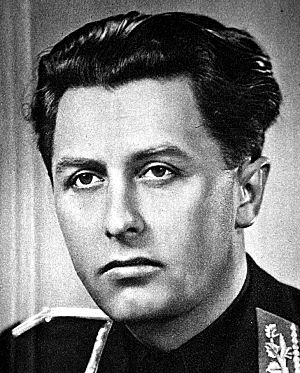Alexander Mach facts for kids
Quick facts for kids
Alexander Mach
|
|
|---|---|
 |
|
| Born |
Alexander Mach
October 11, 1902 Slovenský Meder, Nyitra County, Kingdom of Hungary
|
| Died | October 15, 1980 (aged 78) |
| Nationality | Czechoslovakian |
| Known for | Politician |
| Title | Head of the Hlinka Guard |
| Term | 1939–1945 |
| Predecessor | Karol Sidor |
| Successor | post abolished |
| Political party | Slovak People's Party |
Alexander Mach (born October 11, 1902, in Slovenský Meder – died October 15, 1980, in Bratislava) was an important Slovak politician. He was known for his strong support of Germany during World War II.
Early Political Life
Alexander Mach joined the Slovak People's Party when he was young. He quickly became a key helper for another politician named Vojtech Tuka. Mach worked as an editor for the party's newspapers, Slovák and Slovenská Pravda. In 1924, he joined the party's main political group.
Mach was part of a group within the party that strongly supported ties with Germany. He also led a group called the Rodobrana in the 1920s. In 1938, he wrote an article suggesting the party should have its own armed group. This led to the creation of the Hlinka Guard. Mach became the leader of this group in March 1939.
Role in the Slovak Republic
Mach became even more important in 1938 after the Munich Agreement. This agreement changed the map of Europe and led to a rise in Slovak national feelings. Mach worked closely with Vojtech Tuka and Ferdinand Ďurčanský.
He was known for giving powerful speeches. Mach played a big part in the events that followed the breakup of Czechoslovakia in March 1939. He was in charge of the Slovak Office of Propaganda.
Initially, Mach served as the Minister of Propaganda in the first Slovak Republic. Later, from July 1940 until 1944, he became the Minister of Interior. This meant he was in charge of internal affairs, like police and security.
Mach, like Tuka, supported policies that favored Germany. He wanted Slovakia to become a state similar to Germany. This often caused disagreements with President Jozef Tiso, who was less extreme.
Because of his strong pro-German views, Germany always supported Mach for high positions. In 1941, Mach even planned to set up special camps in Slovakia for the Germans. However, this plan was not carried out, as the Germans decided to use other locations.
Later Life
Alexander Mach remained a strong supporter of Nazi Germany. When the Slovak government collapsed in 1944, he left Slovakia. He moved to Vienna, where he was named Minister of Home Affairs in a government that was in exile and still supported Germany.
After World War II ended, Czechoslovakian authorities arrested him. He was put on trial and sentenced to thirty years in prison for his actions during the war. Mach was released from prison in 1968. He then lived in Bratislava, receiving a state pension, until he passed away in 1980.
See also
 In Spanish: Alexander Mach para niños
In Spanish: Alexander Mach para niños
 | Sharif Bey |
 | Hale Woodruff |
 | Richmond Barthé |
 | Purvis Young |

